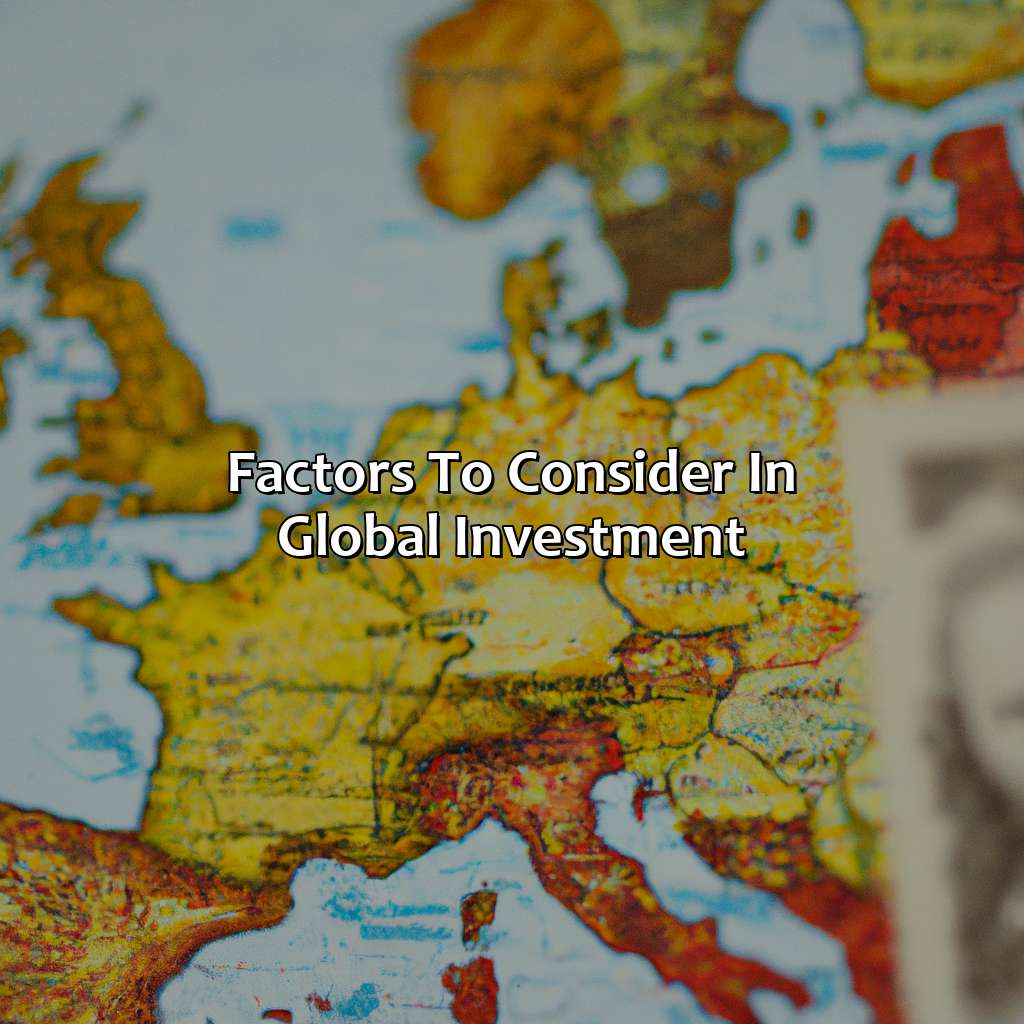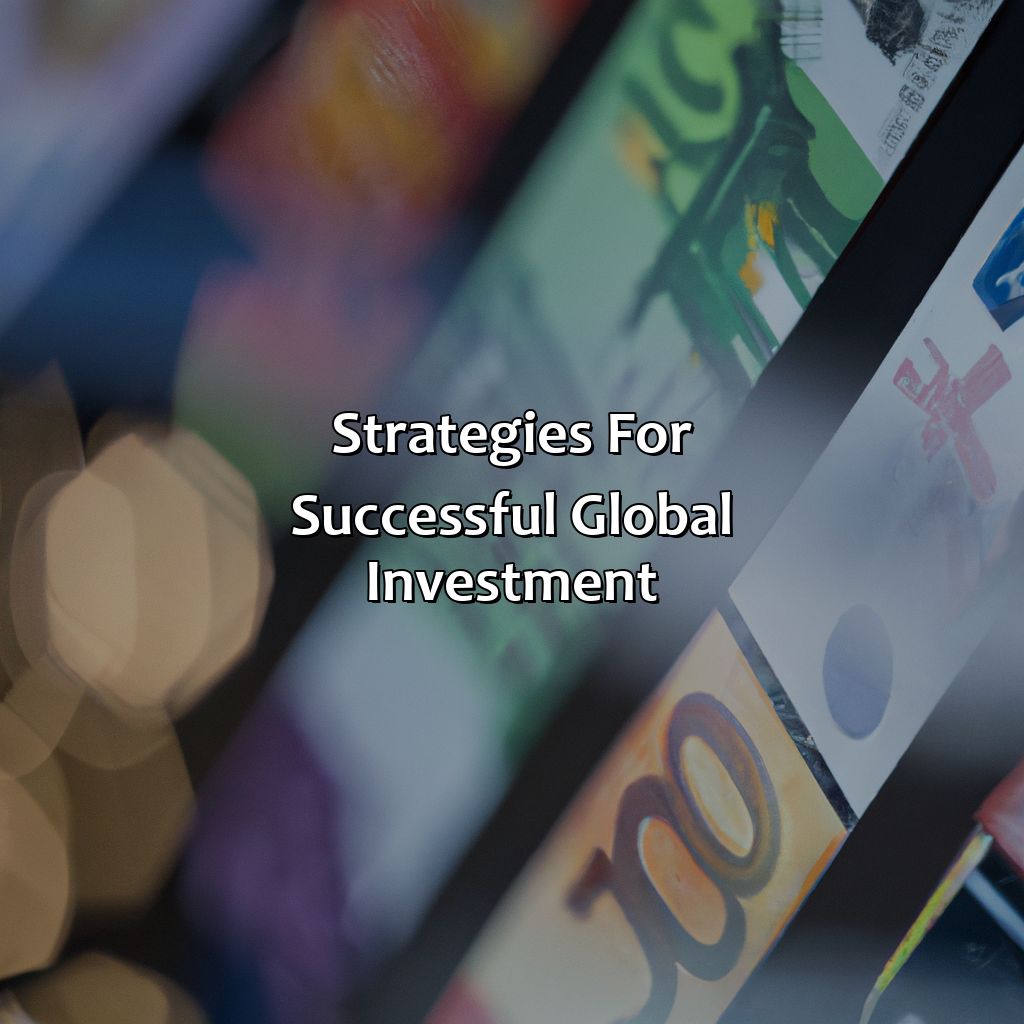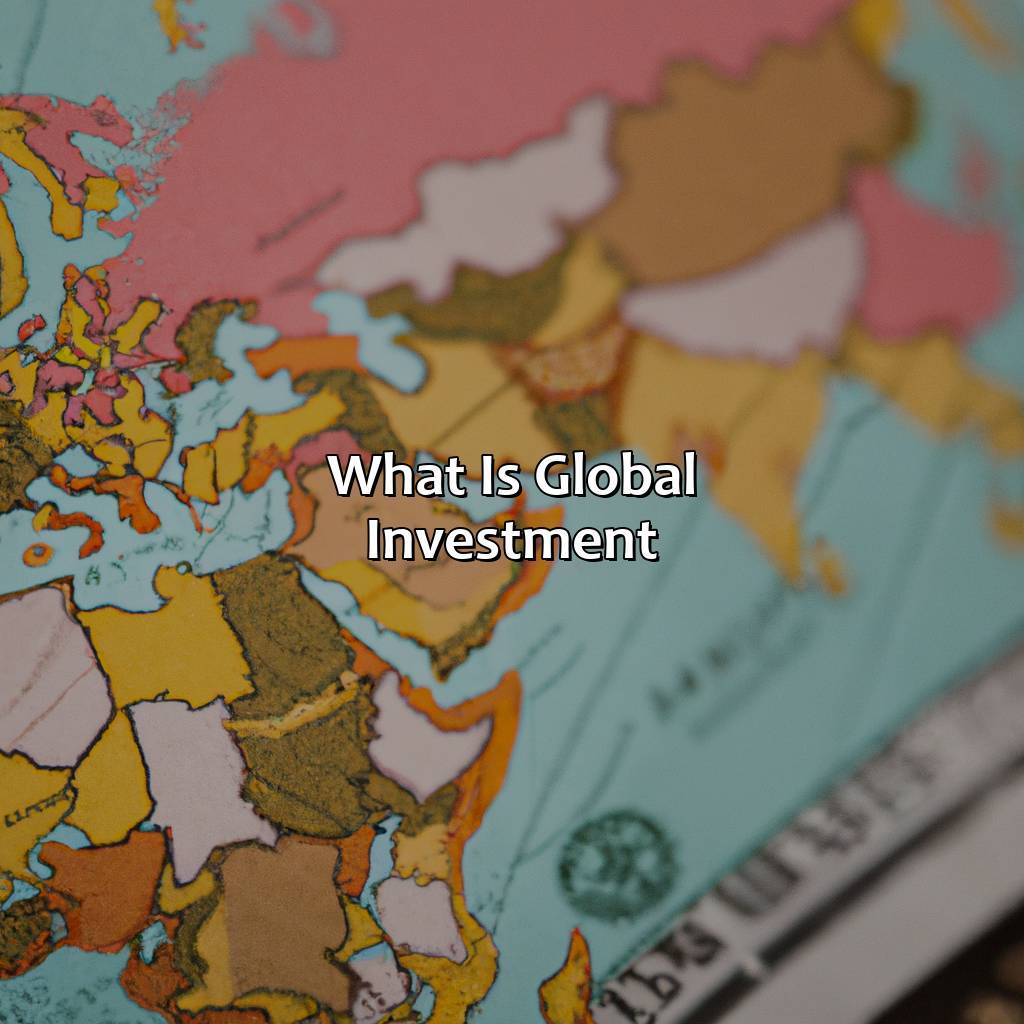What Is Global Investment?
Key Takeaway:
- Global investment refers to the practice of investing in foreign markets and assets, with the goal of diversifying and growing one’s investment portfolio beyond domestic markets.
- Types of global investment include foreign direct investment, portfolio investment, and international borrowing and lending. Each type of investment has its own benefits and risks, and it is important to understand them before investing.
- Global investment is important for several reasons, including accessing new markets and opportunities, reducing risk through diversification, and potentially earning higher returns. However, it is crucial to consider factors such as economic conditions, political stability, and cultural differences before making any global investment decisions.
Are you interested in learning more about global investment? Whether you are a beginner or seasoned investor, it is essential to understand what it is and the risks associated with it. This article will provide you with a comprehensive overview of global investment, helping you make informed decisions.
What is Global Investment?
To comprehend global investment, its definition must be known. As well as the types of global investment and its relevance. Here, the concept is examined, its forms, and why it is important in today’s economy.

Image credits: retiregenz.com by Adam Duncun
Definition of Global Investment
Global Investment refers to the process of investing in financial assets such as stocks, bonds, and mutual funds across different countries and regions. This allows investors to diversify their investment portfolio and potentially earn higher returns.
Investors can choose from a wide range of global investment options, including international bonds, foreign currency exchange markets, and emerging market equities. However, as these investments carry a higher level of risk due to various economic and political factors across borders, investors must conduct thorough research before making any investment decisions.
Furthermore, it is crucial for investors to monitor their global investments regularly to ensure they align with their long-term financial goals. Professional advice can also be sought for better decision-making on global investment options.
Ultimately, successful global investing involves careful analysis of the economic conditions of various countries in conjunction with an understanding of worldwide trends in business activity. By taking a strategic approach, investors can enjoy both stability and substantial growth in their portfolios.
Investing globally is like playing a game of Risk, just without the dice-rolling and cool figurines.
Types of Global Investment
Exploring the Varied Forms of Global Investment
Global investment is a diverse area that encompasses various forms of investment that are available to investors worldwide. These include foreign direct investments, portfolio investments, derivatives, and real estate. Here is an overview of these popular forms of global investment:
| Type of Investment | Features |
|---|---|
| Foreign Direct Investments | Physical presence & ownership among foreign entities. |
| Portfolio Investments | Investment in stocks, bonds & other financial assets. |
| Real Estate | Investment made by buying, renting or leasing properties across borders. |
| Derivatives | Multi-dimensional securities contingencies based on a potential future event. |
Apart from these forms, there are also other unique types such as angel investments and venture capital investments.
Investments require thorough analysis and research before you invest your money into any project. For instance, when making a real estate investment globally, it’s essential to identify the property’s location’s dynamics since some countries’ property market may seem lucrative on the surface but have a weak infrastructure support system.
It is wise to seek the expertise of seasoned investors or engage competent advisers to evaluate opportunities in diverse markets for their risks and rewards based on one’s financial goals.
To allocate capital more efficiently globally, forming collaborations with local investors or partnering through structured investment vehicles or funds can be used to spread risks while mitigating the uncertainties deriving from changes in regulations, currency fluctuations and political circumstances across different regions.
If you want your money to go places, global investment is just the ticket – just don’t forget to pack your portfolio.
Importance of Global Investment
Global Investment outlook is indispensable for the growth of businesses and nations. Diversification helps to lower risk and maximize profits. Investing globally provides investors with opportunities to tap into markets previously inaccessible, which increases returns on investments. Global investment also stimulates economic development in emerging markets by improving infrastructure, job creation, and access to education and healthcare.
In addition, global investment provides a chance to compare economies from different regions, learn about new products and services as well as embrace diversity. It’s important that investors understand the benefits of investing globally in order to know where to allocate their resources for maximum profit.
A crucial aspect not yet covered is that global investment can lead to corporate social responsibility initiatives in foreign countries where poor governance and environmental regulations exist. Companies can invest sustainably in CSR programmes such as promoting ethical standards, development projects or establishing training programs.
Accordingly, the emergence of ESG investments (environmental, social and governance) is gaining ground worldwide as it aligns corporate strategy with broader societal concerns like climate change.
Research suggests that over 20% of institutional investors worldwide have $1 billion or more invested in ESG funds. Thus demonstrating companies’ intentions about how they conduct themselves ethically have come under more intense scrutiny than ever before.
Accordingly when considering global investments; Having knowledge about responsible investments management exposes investors’ potential risks associated with unethical business practices whilst providing insights on a company’s stability morally and socially justifiable without compromising financial return margins, demonstrates efficacy seeking sustainable long term reward opportunities over short term gains.”
With global investment, it’s important to remember that diversification is key, unless you’re a gambler who likes to bet it all on one international pony.
Factors to Consider in Global Investment
Considering global investment necessitates evaluating a range of factors. In this section, you’ll inspect the essential elements that will shape your investment plan. Analyzing each possible investment requires factoring in Economic Conditions, Political Stability, and Cultural Differences. It’s crucial to take them into account.

Image credits: retiregenz.com by James Woodhock
Economic Conditions
Factors affecting the state of the economy are crucial to global investment decisions. Investors must analyze economic variables such as inflation, interest and exchange rates, and government policies affecting business growth. These aspects impact potential returns and risks associated with investments.
Developing countries with high GDP growth rates offer considerable investment options for global investors. Markets in these regions have rapid expansion opportunities, but economic conditions such as currency fluctuations and political instability may pose risks.
Unfavorable economic conditions create a challenge for global investors seeking to maximize their returns. Economic indicators such as high unemployment or low consumer confidence may result in lower demand for goods and services, causing a recession in that country’s economy.
A notable example is China’s significant decrease in foreign direct investment from $135 billion to $59 billion over the past few years due to regulatory restrictions by the Chinese government.
Understanding the complex dynamics of economic conditions is crucial when investing globally. A comprehensive analysis helps minimize risk while maximizing returns.
Political stability is like a unicorn – rumored to exist, but hard to find in the wild world of global investment.
Political Stability
A key consideration in the realm of global investment is the level of stability within national political systems. The security and predictability of a country’s political environment can have a profound impact on the success or failure of an investment venture. Factors that might influence this stability include democratic processes, civil liberties, transparency and the rule of law. The capacity and willingness of governments to maintain peace and security also factor into this equation.
It’s important for investors to understand the nuances that exist within different countries’ political systems, as well as keep tabs on potential changes that could impact investments. For example, elections – particularly those that shift power substantially – may cause uncertainty within a country’s political environment. This could result in significant market fluctuations or other unforeseen impacts. It’s important to have contingency plans in place for dealing with these types of situations.
One notable historical example of how political instability can impact investments is the 2010 uprisings in Egypt. These events resulted in significant social unrest and an overall decrease in public confidence. Many businesses faced significant losses during this period, highlighting just how closely interconnected politics and investments can be on a global scale.
Global investment might be universal, but cultural differences can make it feel like investing in a parallel universe.
Cultural Differences
Acknowledging Diverse Customs- An essential factor in Global Investment
International investments should consider cultural disparities as it impacts overall business growth. It is necessary to respect each group’s characteristics and customs to build long-lasting relationships. Investors need to understand diverse attitudes towards risk-taking, decision-making, and evaluate geographical and political background.
Additionally, teams can benefit from the knowledge of local advisors or consultants for international markets in gaining equity with their prospective investors. They need to develop individual negotiation strategies keeping essential cultural distinctions under consideration.
To avoid miscommunication, organizations must prompt their team members through cross-cultural education programs. Coaching sessions allow investors working in multinational firms to create a common language that enhances cooperation with clients across borders.
Diverse Social Principles – A vital aspect of International Investments
Businesses should be familiarized with local values before investing globally. Depending on regional standards, prevailing social norms may dominate certain sectors; therefore, businesses must address these principles’ sensitivity when planning investments.
Investors have recommended an in-depth analysis of prevailing laws while deciding on investments because it tends to vary significantly amongst countries worldwide. Thus giving importance to principles and cultures before launching international operations is an efficient way of securing stable market growth.
A successful global investment strategy is like a game of chess- it takes strategy, patience, and a willingness to sacrifice a few pawns along the way.
Strategies for Successful Global Investment
To win big in global investment, diversify! Research, analyze, and build a network of partnerships. These strategies help you spread your investments across multiple markets and industries. Make decisions based on data and market trends. Establish connections with experts in various areas for valuable advice and opportunities.

Image credits: retiregenz.com by Harry Jones
Diversification
Investment Diversification involves allocating funds across different asset classes to minimize risks. This approach aims to mitigate prospective losses that could result from investing in a single security or asset class. A diversified portfolio enhances investment opportunities and ensures steady returns.
To achieve Investment diversification, investors must identify and select different securities, industries, or even countries to maximize returns while reducing risk levels. This technique allows investors to spread their funds more efficiently and reduce vulnerability from fluctuating market conditions.
Investors can use modern portfolio theory metrics like the Sharpe Ratio, Beta, and Alpha to improve diversification strategies. Proper diversification guarantees stable investments, which ultimately reduces the overall risk of capital loss.
A well-diversified portfolio entails selecting a broad range of asset classes such as stocks, bonds, currencies and commodities for long-term growth potential. It also involves making periodic reviews of investment objectives and adjusting the portfolio accordingly.
Additionally, another common strategy is dollar-cost averaging; this approach utilizes fixed amounts of capital gradually invested over an extended period in assets rather than a lump-sum investment. This strategy aims at reducing investor anxiety since its focus is on building a position over time with minimal risks associated with buying during market peaks or downturns.
Investors who adopt these methods increase their chances of success in global investments by limiting losses while capitalizing on opportunities typically brought by market volatility.
Research and analysis are the backbone of successful global investment, unless you’re one of those people who just throws a dart at a world map and hopes for the best.
Research and Analysis
Conducting in-depth and comprehensive analytical research is a vital component of successful global investment. The process comprises gaining insights into diverse asset classes, international markets, global geopolitical events and trends that can potentially impact portfolios. This research involves both quantitative and qualitative data analysis and involves conducting feasibility studies to ensure that the investment aligns with investors’ needs.
A thorough understanding of the target market is critical in global investment research. It involves analyzing market dynamics, identifying industry drivers, assessing key competitive factors, risk assessment and establishing entry/exit strategies based on findings. The goal is to gain necessary information to minimize risks while maximizing returns on investments.
Creating a global perspective requires evaluating factors beyond local jurisdiction’s scope. These factors include exchange rates fluctuations, economic conditions, political stability, culture considerations etc. It entails employing cutting-edge analytical tools in finance such as Machine Learning algorithms to solve problems or analyze complex data for accurate predictions.
Effective global investment research helps identify opportunities within specific geographies or sectors providing timely counsel to investors and yielding lucrative benefits both long-term and short-term goals. Missing these opportunities may result in massive losses or unrecognized gains.
Networks and Partnerships
Building Alliances and Collaborations
To succeed in global investment, building alliances and collaborations is crucial. Developing trustworthy relationships with partners helps businesses to leverage the knowledge, expertise, and assets of their collaborators, leading to more fruitful outcomes. With an ever-increasing rate of change in business strategy, it has become a necessary approach to rely on an extensive network of allies.
Networking with individuals and organizations working within similar fields can point towards an array of potential opportunities for improvement. Enterprises that establish powerful relationships harness various benefits, including investments that profit both sides. A successful collaboration involves respect for one another’s objectives, open communication lines and the allocation of resources.
It is essential to choose the right partner for your investment goals as dedicated teamwork often leads to profitable outcomes. An informed decision can be made through investigating various allied companies’ performances within the industry or past deals inked by them.
Collaboration between Apple Inc., Sony Corporation, Ericsson Inc., Nokia Corp sought to create open standard interface specifications across all cellular devices was established in 2010 called The Mobile Competence Center. Although it eventually dissolved due to strategic differences among its members; it demonstrated how collaborative work could drive-innovation even amongst major competitors.
Five Facts About Global Investment:
- ✅ Global investment involves investing money in companies located around the world. (Source: Investopedia)
- ✅ International diversification is a key benefit of global investment. (Source: The Balance)
- ✅ Exchange rates can greatly impact global investment returns. (Source: Forbes)
- ✅ Global investment strategies may involve actively managed funds or passive index funds. (Source: Vanguard)
- ✅ Political instability and other global events can significantly impact the performance of global investments. (Source: CNBC)
FAQs about What Is Global Investment?
What is global investment?
Global investment refers to investing in assets or securities in various countries around the world. This type of investment involves diversification across different regions, currencies, and economies.
Why is global investment important?
Global investment allows investors to spread their risk across different markets and reduce the impact of economic fluctuations in any one region. It also provides the potential for higher returns as investors have access to a variety of investment opportunities.
What are the different types of global investment?
There are several types of global investment, including international mutual funds, exchange-traded funds (ETFs), individual stocks and bonds, real estate, and foreign currencies.
What are the risks associated with global investment?
The risks of global investment include geopolitical risks, currency risk, regulatory risks, and market volatility. It’s important for investors to educate themselves on these risks and to diversify their portfolios to mitigate any potential losses.
How can I start investing globally?
One way to invest globally is to work with a financial advisor or broker who specializes in global investments. Investors can also research and invest in international mutual funds, ETFs, and individual stocks.
What are some benefits of investing in emerging markets?
Investing in emerging markets can provide attractive returns due to their higher growth potential. They can also offer diversification benefits as their economies may not be as correlated with developed markets. However, investing in emerging markets can also carry higher risks due to political and economic instability in those regions.
